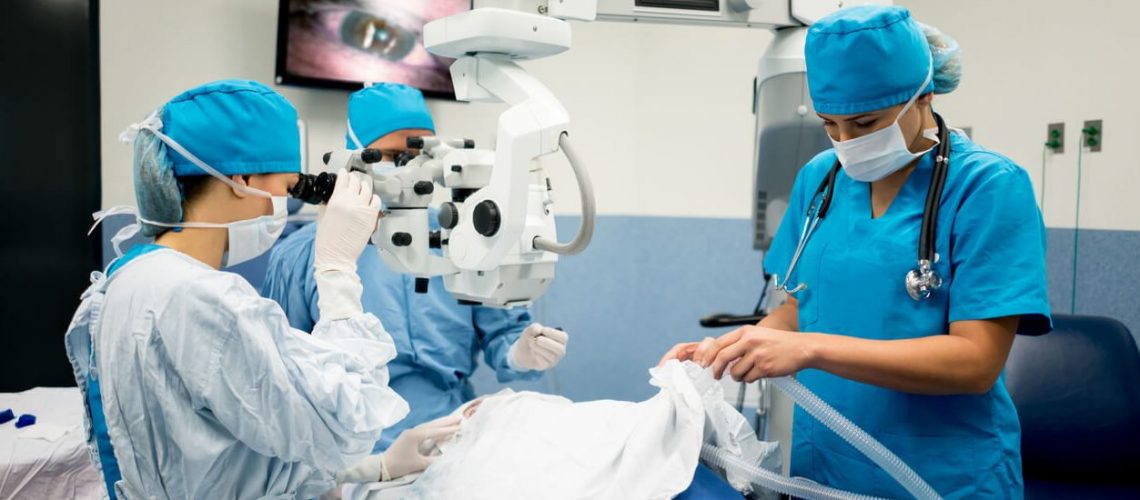We often take our sight for granted, but conditions like cataracts can arise and impair our vision unless we take action.
If you are in doubt, it is best to arrange a consultation with your friendly Ophthalmologist (Eye surgeon), particularly if you have diabetes, short- (myopia) or long-sightedness (hyperopia), or a family history of cataracts or glaucoma.
Do I need cataract surgery?
Cataracts are usually noticed around the age of 60. You can be alerted to them by symptoms such as;
- Hazy or cloudy vision in distance or near vision, or both.
- Colours appearing more dull
- Difficulty driving at night
- Sensitivity to glare and light
- Frequent changes to the prescription of your current glasses
The benefits of cataract surgery
Cataract surgery will improve your outlook on life – literally – because cataracts are located in the lens through which we view the world. A cataract is the clouding of the lens of the eye. This should be clear, but if the clouding is dense enough, your vision will be affected, and the clarity and brightness of objects around you will decrease. A cataract operation will restore this and improve the quality of life. It is the most commonly performed eye procedure in Australia and all over the world.
While cataract surgery dates back centuries, the methodology has evolved over time to now one of the most successful surgeries in all of medicine.
How do you prepare for cataract surgery?
Dr Tony Chen top tips
Congratulations on making the decision that will improve your vision and quality of life!
First, please make sure you understand the risks, benefits and limitations of cataract surgery.
Your friendly eye surgeon should tailor the final focus (refraction) outcome of the eye based on your everyday needs.
The hospital will then provide instructions on the admission time, when to fast before surgery (usually 6 hours prior to surgery time), accompanying carer on the day of surgery and any other questions you may have. You may take your regular medications with a sip of water at 7 am on the day of surgery.
What happens during cataract surgery?
You will spend around 2.5 to 3 hours at the surgical facility on the day. General anaesthesia is not typically required in cataract surgery, except in certain complicated circumstances. This means you will be awake for the surgery, but may be drowsy from some light sedation (twilight anaesthesia) as needed.
After some eye numbing drops and/or local anaesthetic around the eye, you may see flashes of light, kaleidoscopic patterns or it may be completely dark. There is no pain during the surgery. The eye is then cleaned from an aseptic solution and a sterile surgical drape is placed over the eye to cover the head. Don’t worry, you will have plenty of oxygen underneath the drape.
You will hear the voice of the surgeon and our staff and machine buzzing sounds. The surgery involves removing the cataract using an tiny ultrasound (phacoemulsification) probe through a micro-incision around 2mm and the placement of an intraocular lens (IOL) to restore your vision. The incision typically does not require sutures and heals overnight.
After the surgery in around 10-30 minutes, you will have either a pad or clear plastic eye shield and will proceed to the recovery lounge before your carer takes you home.
As part of our thorough discharge process, our nurses will assess you, and once they are happy with your recovery, you will be given a detailed set of instructions and discharged from the day hospital. You will have a follow up the next day and will be examined at the clinic.
What can I expect after cataract surgery?
In most cases, recovery from cataract surgery is short, with our patients experiencing much clearer vision the next day. In other cases, vision is restored within a few days. With our specialised and expert approach, we treat each case individually and go through the process and recovery with you to ensure your peace of mind.
Many questions arise about what to expect after surgery. First and foremost, you will need to use eye drops over four weeks after the operation to prevent infection, inflammation and facilitate healing.
In terms of your glasses, the immediate results will be a much better sight at a distance of your choosing and your old glasses will no longer work after the operation.
As the implanted IOLs are so clear, albeit they have in-built UV protection, we still recommend our patients wear sunglasses when outdoors for comfort and maximum UV protection.
At home, you should be able to do light housework and watch TV within a day. However, it’s best to avoid water in the eyes for one week and swimming for two weeks to avoid any germs that could cause an eye infection.




